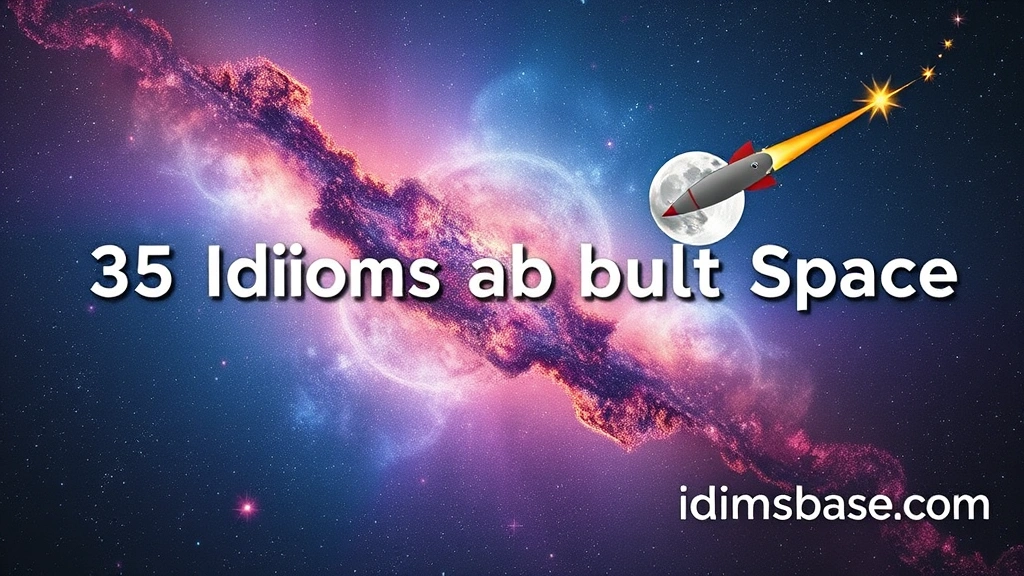Isn't it fascinating how we humans often look to the stars, not just for wonder, but for words? Our language is absolutely brimming with expressions that draw inspiration from the vast, mysterious expanse of space. From the twinkling stars to the mighty planets, the cosmos has given us a treasure trove of idioms that we use every single day, often without even realizing their cosmic origins!
Have you ever wondered why we say someone is "over the moon" when they're thrilled? Or why a difficult task might be described as "rocket science"? These aren't just random phrases; they're vivid, imaginative snapshots of how we perceive our universe and our place within it. Get ready to embark on a linguistic journey through the cosmos as we explore 35 incredible idioms about space! You're about to discover how the universe has shaped the way we speak, bringing a little bit of stardust into our conversations.
Blast Off into Understanding: 35 Space Idioms You Need to Know
Let's dive right in and explore these stellar expressions. You'll be surprised at how many you already use and how many new ones you can add to your vocabulary!
Idioms Related to Stars and Planets
The celestial bodies above have inspired countless ways of speaking.
- Over the moon: You're probably familiar with this one! It means extremely happy or ecstatic. Think about how incredible it would be to actually visit the moon – that's the level of happiness we're talking about!
- Example: "She was over the moon when she got accepted into her dream university."
- Reach for the stars: This encourages you to aim high, pursue ambitious goals, and not limit your aspirations.
- Example: "Don't be afraid to reach for the stars; your potential is limitless."
- Star-studded: Describes an event or cast that features many famous or prominent people.
- Example: "The awards ceremony was a star-studded affair, with celebrities everywhere."
- Born under a lucky star: This means someone is naturally fortunate or destined for good things.
- Example: "He always seems to win raffles; he must have been born under a lucky star."
- See stars: Usually means to feel dizzy or disoriented, often after a blow to the head. It's like your vision is blurry with flashes of light.
- Example: "After bumping his head, he literally saw stars for a few seconds."
- Thank your lucky stars: Express gratitude for good fortune or avoiding a bad situation.
- Example: "You should thank your lucky stars you weren't on that flight."
- Wish upon a star: To make a wish with the hope that it will come true, often associated with childhood dreams.
- Example: "Every night, she would wish upon a star for a pet puppy."
- Shoot for the moon: Similar to "reach for the stars," this means to aim for a very difficult or ambitious goal.
- Example: "We're going to shoot for the moon with this new project and try to revolutionize the industry."
- Once in a blue moon: This refers to something that happens very rarely. A "blue moon" is the second full moon in a calendar month, which is an uncommon occurrence.
- Example: "My brother lives abroad, so I only see him once in a blue moon."
- A rising star: Describes someone who is becoming very successful or popular in their field.
- Example: "That young actress is a rising star in Hollywood."
- Have stars in one's eyes: To be optimistically enthusiastic or romantically infatuated, often to the point of being naive.
- Example: "When he talks about his new business, he truly has stars in his eyes."
- The sky's the limit: There are no limits or boundaries to what can be achieved.
- Example: "With hard work and dedication, the sky's the limit for your career."
- Out of this world: Describes something extraordinary, amazing, or incredibly good.
- Example: "That chocolate cake was absolutely out of this world!"
- In orbit: Figuratively, to be in a state of excitement, anticipation, or even confusion, circling around a central idea or event.
- Example: "She's been in orbit ever since she heard about the job offer."
- Down to earth: Practical, realistic, and sensible. The opposite of being "in the clouds."
- Example: "Despite his fame, he's a very down-to-earth person."
- Come back to earth: To return to reality after a period of dreaming, fantasizing, or being overly excited.
- Example: "After winning the lottery, it took him a while to come back to earth."
Idioms Involving Space Travel and Concepts
From rockets to the vastness itself, these idioms bring the feeling of exploration into our daily speech.
- Rocket science: Used to describe something that is very difficult or complicated to understand. It implies it's as complex as designing a rocket!
- Example: "Learning to use this new software isn't rocket science; you'll get the hang of it."
- Launch into: To begin something suddenly or with great energy, like a rocket launching into space.
- Example: "He launched into a detailed explanation of his new invention."
- Blast off: To begin something with great energy or enthusiasm, or to depart very quickly.
- Example: "The new marketing campaign is ready to blast off next week!"
- Space out: To become inattentive or distracted, as if one's mind is drifting off into space.
- Example: "I tend to space out during long meetings."
- Zero gravity: Figuratively, a state of being weightless or without strong influence, sometimes used to describe a feeling of detachment or freedom.
- Example: "After finishing her exams, she felt a sense of zero gravity, finally free from pressure."
- In a different orbit/on another planet: To be completely out of touch with reality or to have very different ideas or perspectives from others.
- Example: "His suggestions for the project were so bizarre, it felt like he was on another planet."
- The final frontier: Refers to the ultimate challenge or unexplored territory, often implying great potential and mystery.
- Example: "Space exploration is truly the final frontier for humanity."
- Cosmic joke: A situation that is ironically unfortunate or seemingly arranged by fate to be humorous in a cruel way.
- Example: "Losing my keys right after I bought a new lock felt like a cosmic joke."
- Light years ahead: Far superior or more advanced than others, often in terms of progress or development.
- Example: "Their new technology is light years ahead of the competition."
- Into the great wide open: To venture into unknown or expansive territory, often with a sense of freedom or adventure.
- Example: "After graduation, she felt ready to step into the great wide open and explore the world."
- To be lost in space: To be completely bewildered, confused, or without direction.
- Example: "Trying to navigate that massive airport, I felt completely lost in space."
- One giant leap: A significant and groundbreaking advancement or achievement, referencing Neil Armstrong's famous words.
- Example: "The invention of the internet was one giant leap for communication."
- To have one's head in the clouds: To be impractical, unrealistic, or daydreaming.
- Example: "He's a dreamer, always having his head in the clouds instead of focusing on his responsibilities."
- To fall back to earth with a bump: To experience a sudden and harsh return to reality after a period of excitement or success.
- Example: "After the initial success, the company fell back to earth with a bump when sales declined."
- Beyond the pale: Beyond the limits of what is acceptable, reasonable, or morally correct. While not directly space-related, it evokes a sense of being "outside" what's known or safe.
- Example: "His behavior at the party was completely beyond the pale."
- In the galaxy of: Used to describe a group or category of similar things, often implying a vast number.
- Example: "Among the galaxy of modern artists, her unique style truly stands out."
- A shooting star: A sudden, brief, and spectacular success or occurrence.
- Example: "That startup was a shooting star, rising quickly but then fading just as fast."
- To gravitate towards: To be naturally drawn to something or someone, like gravity pulling objects together.
- Example: "She always tends to gravitate towards creative projects."
- The big bang: Refers to a sudden, momentous beginning or creation, often used informally for a dramatic event.
- Example: "The company's new product launch was the big bang that revolutionized the market."

Table of Space Idioms and Their Meanings
To help you quickly reference these out-of-this-world phrases, here's a handy table!
| Idiom | Meaning |
|---|---|
| Over the moon | Extremely happy |
| Reach for the stars | Aim high; pursue ambitious goals |
| Star-studded | Featuring many famous people |
| Born under a lucky star | Naturally fortunate |
| See stars | Feel dizzy or disoriented (after a blow) |
| Thank your lucky stars | Be grateful for good fortune |
| Wish upon a star | Make a wish with hope |
| Shoot for the moon | Aim for a very difficult goal |
| Once in a blue moon | Very rarely |
| A rising star | Someone becoming successful/popular |
| Have stars in one's eyes | Optimistically enthusiastic; naive |
| The sky's the limit | No limits to what can be achieved |
| Out of this world | Extraordinary; amazing |
| In orbit | In a state of excitement, anticipation, or confusion |
| Down to earth | Practical, realistic, sensible |
| Come back to earth | Return to reality after excitement/dreaming |
| Rocket science | Something very difficult or complicated |
| Launch into | Begin suddenly or with great energy |
| Blast off | Begin with great energy; depart quickly |
| Space out | Become inattentive or distracted |
| Zero gravity | Feeling weightless, detached, or free from influence |
| In a different orbit/on another planet | Out of touch with reality; very different ideas |
| The final frontier | Ultimate challenge; unexplored territory |
| Cosmic joke | Ironically unfortunate situation |
| Light years ahead | Far superior or more advanced |
| Into the great wide open | Venture into unknown, expansive territory |
| To be lost in space | Completely bewildered, confused, or without direction |
| One giant leap | Significant and groundbreaking advancement |
| To have one's head in the clouds | Impractical, unrealistic, daydreaming |
| To fall back to earth with a bump | Sudden, harsh return to reality after excitement/success |
| Beyond the pale | Beyond acceptable limits |
| In the galaxy of | Among a vast group or category of similar things |
| A shooting star | Sudden, brief, spectacular success |
| To gravitate towards | To be naturally drawn to something/someone |
| The big bang | Sudden, momentous beginning or dramatic event |
Frequently Asked Questions About Space Idioms
You've got questions, and we've got answers! Let's clear up some common queries about these fascinating phrases.

What is an idiom, and why do we use them?
An idiom is a phrase or expression whose meaning cannot be understood from the ordinary meanings of its individual words. For example, "kick the bucket" doesn't literally mean to kick a bucket; it means to die. We use idioms to make our language more colorful, expressive, and often more concise. They add a layer of cultural richness and can convey complex ideas in a memorable way. Think of them as linguistic shortcuts that add flair!
Are space idioms common in everyday conversation?
Absolutely! Many space idioms, like "over the moon," "once in a blue moon," and "rocket science," are incredibly common and integrated into daily English conversation. Others might be used less frequently but are still widely understood. You'll hear them in casual chats, in movies, on TV, and in written articles.
Do these idioms have the same meaning in other languages?

Generally, no. Idioms are very language-specific and often don't translate directly. A literal translation of an English idiom into another language would likely make no sense. This is why learning idioms is a great way to deepen your understanding of a language and its culture. While some cultures might have similar concepts, the exact phrasing and imagery will differ.
How can I learn and remember new idioms?
The best way to learn idioms is to see them in context.
- Read widely: Pay attention to how native speakers use them in books, articles, and online content.
- Listen actively: Watch movies, TV shows, and listen to podcasts.
- Practice using them: Try to incorporate new idioms into your own conversations and writing. Start with just one or two that you find interesting.
- Create flashcards: Write the idiom on one side and its meaning (and an example sentence) on the other.
- Relate them to their origin: Understanding the "space" connection for these idioms can help them stick in your mind!
Why are so many idioms related to space?
Humans have always looked up at the sky with wonder, curiosity, and a touch of fear. The vastness, mystery, and predictable cycles of celestial bodies have profoundly influenced our thinking and culture. It's natural that this deep fascination with the cosmos would find its way into our language, providing powerful metaphors for everything from happiness to difficulty, ambition to confusion. Space offers a universal canvas for human experience, making it a rich source for imaginative expressions.
Key Takeaways: Your Cosmic Conversation Guide
You've journeyed through the linguistic cosmos, and now it's time to bring it all back down to earth! Here are the key things to remember about space idioms:
- Language is inspired by everything around us: Our fascination with the universe has deeply enriched the English language, giving us vibrant ways to express complex ideas.
- Idioms add color and depth: They make your communication more engaging, expressive, and often more concise. Instead of saying "I was extremely happy," you can say "I was over the moon!"
- Context is king: The meaning of an idiom can’t be guessed from its individual words, so always learn them in context.
- Practice makes perfect: The more you expose yourself to and use these idioms, the more naturally they'll become a part of your vocabulary. Don't be afraid to shoot for the moon with your language skills!
- They're universally understood (within English): While they don't translate literally, these space idioms are widely recognized by English speakers globally, making them a great tool for connecting with others.
So, the next time you're having a conversation, try to sprinkle in one of these stellar phrases. You'll not only sound more like a native speaker but also appreciate the incredible connection between our language and the boundless universe above us. Who knew that learning about idioms could be so out of this world? Now go forth and make your conversations truly cosmic!






